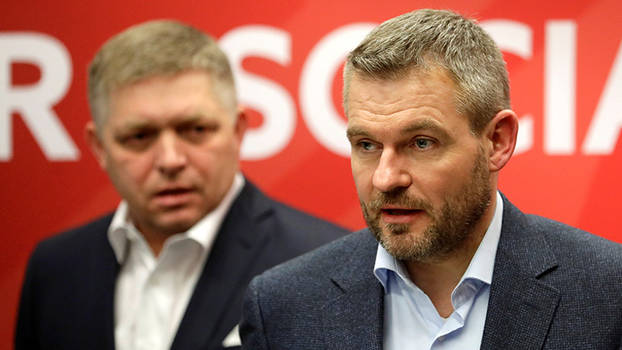
Parliamentary elections for the 150-seat Slovakian National Council took place on 29 February 2020. On the night of the elections, many initial reactions spoke of a political upheaval imposed by popular will with a voter turnout of 65.8 percent. The events seemed to unfold in a frenzy but the next day the landscape looked pretty clear.
Joanna Gwiazdecka runs the RLS Regional Office for Central Europe in Prague.
The former ruling parties took the greatest hit. The smaller coalition partners – the Slovak Nationalists (SNS) and the moderate party of the Hungarian minority Híd/Most (Bridge)—all failed to reach the five-percent hurdle. But the main focus was on the performance of the previously strongest ruling party. The social-democrat-oriented SMER (Direction) suffered heavy losses, receiving merely 18.29 percent of the votes cast (in 2016, it had been 28.28 percent) and is now the strongest opposition party with 38 seats in parliament. Observers had already agreed beforehand that the party that had been politically decisive in shaping the country’s fate since 2006 (with the exception of a brief interruption) would pay a high price for its involvement in a corruption scandal, which, in 2018, reached a sad climax with the murder of the young journalist, Ján Kuciak. The question of whether incumbent Prime Minister Peter Pelegrini and party leader Robert Fico would continue to work together must be left open for the time being since both of them have quite different ideas about the future of the Slovakian social democrats, as initial reactions to the election results have shown.
It is no surprise, then, that almost all other election campaign issues were overshadowed by the corruption scandal, and that especially the election winner played this tune with virtuosity. The OLaNO Party (Ordinary People and Independent Personalities Party) received 25.02 percent of the votes cast, amounting to 53 seats in parliament. As future prime minister, party leader Igor Matovič will now have a decisive influence on the fate of the country. Matovič is media and real estate entrepreneur who shares many similarities with Czech Prime Minister Andrzej Babiš. The party under Matovič’s leadership is an exclusively electoral party. It has only a few registered members and, as such, is there to serve all others—ordinary people and independent candidates.
In this respect, it is interesting to look at the failure of the joint ticket “Progressive Slovakia”. With this group, President Zuzanna Čaputová tried to gain a foothold in parliament in the hopes of being able to exert more influence on politics in the future. But the plan failed when the liberal-alternative electoral alliance only received 6.96 percent of the votes, just short of the obligatory seven-percent hurdle.
It is still unclear whom election winner Matovič will form a coalition with. Observers speak about difficult negotiations lying ahead with a three-party coalition as the likely outcome.
There are three groups that could be potential government partners for Matovič, all of which are unlikely to be entirely satisfied with their own election results which remained in the single-digit range. In the future parliament, the SME Rodina (We Are Family) will occupy the conservative flank. Led by Boris Kollar, this party received 8.24 percent of the votes and 17 parliamentary seats, only a slight increase from 2016. The Family Party is deemed first coalition partner partly because its programs have many overlapping points with the election winner. Here again, everything was tailored to serve the top candidate. The campaign was simply called “Boris, help!” To this day, Kollar claims not to be a typical politician but to think with his heart.
The liberal group SaS (Freedom and Solidarity), which received 6.22 percent of the votes and 13 seats in parliament, is also considered a coalition partner. The party led by Richard Sulik is regarded as EU-sceptical although this stance could soften under governing conditions. In contrast, the conservative-liberal party “For the People”, led by former President Andrej Kiska, is extremely EU-friendly. It received 5.77 percent of the votes cast and 12 seats in parliament although it probably expected more in the run-up to the elections.
Finally, under Marian Kotleba, the self-styled people’s party “Our Slovakia” entered parliament as a real force openly professes its support for Slovakia’s fascist past between 1939 and 1945, is hostile to the EU and committed to a “truly independent” Slovakia. The Kotleba party won 7.97 percent of the votes and 17 seats in parliament, confirming the 2016 result.
The big election loser SMER is likely to face some changes. However, moving forward, all eyes will be on how the election winner Matovič intends to implement his election promises. Many promises were made, mixing positions ranging from liberal to Christian-conservative. In addition to a determined fight against corruption, issues such as health and education played a greater role. It is interesting that OLaNO also addressed the situation of the Roma minority. The journalist Jarmila Vaňová—a well-known Roma activist—is among the newly elected members of parliament. She is mainly committed to the further emancipation of Roma women and maintains also very good relations with an RLS partner organization in Slovakia. In a conversation with the RLS leading up to the elections, she criticized the fact that the Roma minority is only noticed around election time in an attempt to earn votes, while afterwards it often only receives the proverbial cold shoulder.
Only 30 women will be represented in the new parliament, despite the directly elected president—OLaNO has 14 female members of parliament, SME Rodina and “For the People” have four each, SMER and SaS three each, and two from “Our Slovakia”—pointing out a fundamental problem in Slovakian politics, one that cuts across party lines.